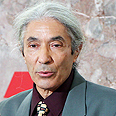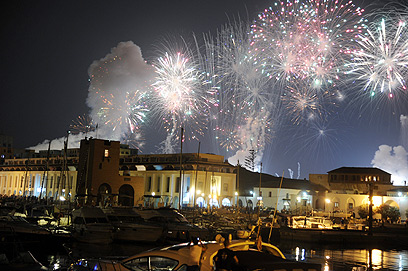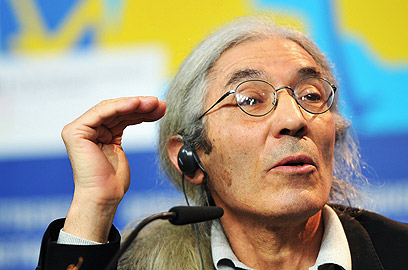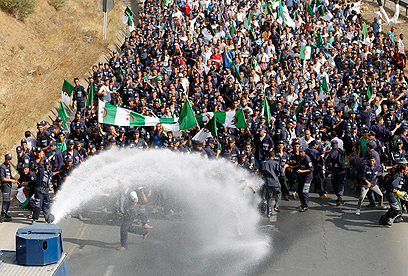
Boycotted Algerian author moved by Lieberman
Boualem Sansal, boycotted in his country due to criticism of radical Islamists, speaks to Ynet about Israel, Arab Spring and literature. 'We can argue about a certain Israeli policy, but the most important thing is to be friends,' he says
The Algerian author also drew harsh criticism from the Arab world and Hamas after he visited Israel in May and participated in the Jerusalem Writers Festival. The Hamas movement called Sansal's visit a "betrayal of the Palestinian people" and the Arab World Institute in Paris cancelled a prestigious prize it was planning to award him.
Surprisingly, the person who immediately came to Sansal's defense was Israeli Foreign Minister Avigdor Lieberman, who urged the international community to denounce the boycott against the author.
Meanwhile, Sansal learned to live in peace with being ostracized in his own country: "It's actually good that my books are boycotted in Algeria. They embody ideas that concern the government; ideas which they do not want society to adopt. To ban, to boycott, to control – these are all part of the nature of the government," Sansal told Ynet in an interview from his whereabouts in North Africa.
Despite his worsening status in the Arab world, Sansal does not regret visiting Israel.
"Regret the visit? Quite the contrary," Sansal exclaimed, "I am glad I visited Israel and returned with great happiness," he noted.

'Algeria rich, its people are poor' (Photo: AP)
"Everyone has his own way of understanding the 'Arab Spring', but the way I see it is the following: The 'Arab Spring' means to leave a regime of fear, a culture of forbiddance, of boycotts, intolerance, arrests, racism, anti-Semitism, violence and irresponsibility – in short, all the loathsome values that were instilled in the Arab nations by violent and corrupt regimes. The 'Arab Spring' means that intellectuals will finally fulfill their role as pioneers and take risks in order to help set their countrymen free."
According to Sansal's vision, only after his country and other Arab states allow the free use of words such as "Israel" and "Jew", and stop responding to them negatively, will relations between Arabs and Israelis become normal. "As soon as there is freedom of speech, it will be possible to disagree with Israel if one wishes to do so – only without the hate. This is the reason I traveled to Israel and this is the reason I will return. We can argue about a certain Israeli policy, but the most important thing is to be friends."
"Because of the things I say, I was attacked by people who promote hatred," Sansal asserted. "I was very surprised to receive messages of support and greetings from Algerians and people in other countries. In the city where I live, everyone knows I visited Israel and that I caused a big ruckus, but no one takes it personally," he added.
'Tel Aviv blew me away'
The Algerian author had only good things to say about Israel and its residents after his visit: "Israelis have all the reasons in the world to be proud of what they have achieved in their country in such a short period of time.
"In so many fields, Israel is at the international forefront and it is very impressive. Tel Aviv's modernity blew me away, literally, and as for Jerusalem, there are not enough words to describe it."
"I wanted to see everything, and to meet as many people as possible – Jewish Israelis and Arab Israelis. But unfortunately, I didn't have enough time. My visit in Israel was only five days long," Sansal said.
"I would like to see an Israeli writer visit Algeria one day. I would welcome him or her," Sansal confesses, adding that he would be honored if it were Amos Oz, David Grossman or A.B Yehoshua. He is nevertheless realistic, stating: "I doubt the Algerian government would grant a visa to an Israeli writer, as the Israeli government has done for me."

'Harsh blow to Arab governments.' Sansal (Photo: Gettyimages)
Sansal's previous visit to Israel must not have contributed to his sense of security, but he prefers to focus on the visit's positive aspects. "I have many friends in Israel, and I am grateful for that. I felt very welcome in Israel. I'm not only referring to official representatives; I'm referring to everyone who came to listen to me and the people who invited me to their homes. It was heart warming."
Regarding Lieberman's support of him following the cancellation of the Parisian prize Sansal he was supposed to receive, Sansal commented: "Lieberman's gesture moved me. When word of his support reached me, I couldn't believe it. His statement was so gracious in comparison to Arab governments. He told them: 'You're persecuting intellectuals. We embrace them and care for their safety. That is why your citizens are rebelling against you.' That is a harsh blow to Arab governments."
Hamas officials in Gaza leveled harsh criticism against Sansal's visit to Israel. "I wouldn’t wish Hamas upon my worst enemy. It is a terrorist movement of the worst kind. Hamas has taken Gazans hostage. It has taken Islam hostage," the writer said.
Arab Spring
People often ask Sansal why he stays in Algeria. Wouldn't he rather emigrate? "Fearing for your safety is natural," Sansal says. "In a country where political assassination is almost part of tradition, one must think twice. With an unstable government and Islamists, one should even think three times. But, well, if you want to make progress, you have to take risks."
"The 'Arab Spring' inspired Islamists – they can rise to power without civil wars – but it also stirred a great fear in them – it could evolve and resemble Eastern European revolutions that overcame tyrannical regimes and brought about democracy, human rights, freedom of thought, of religion, of sex."

'Common people will bring change (Photo: Reuters)
"Islamists would therefore prefer to stop intellectuals from reexamining dogmas, religion, the history of Islam and of the Muslim world. They know that such a reexamination will inevitably lead to revolution, to emancipation of the individual and of society, to a separation of religion and state and to a disempowerment of Islam, as is already evident in Arab communities in the West."
"One can only dream of it," Sansal replied when asked about Israeli-Palestinian peace. "People say that if peace will rule the region, the Israeli-Palestinian duo will make miracles. It used to be a region of miracles and can be a region of miracles once again. It just needs some help. These are two peoples that deserve all the happiness in the world. Both have suffered enough. It will not be fixed by Arabs, Americans, or Russians. It will all be mended by the hands of the Israelis and the Palestinians."
Despite his criticism of Palestinian officials, Sansal remains optimistic. "I would love to be invited to the West Bank some day, and even to Gaza. Here I am expressing that wish; perhaps it will be answered. As for Gaza, I would like to stipulate that wish – that I return from there in one piece."
Inspired to write
Sansal was born in 1949 in a mountainous village near the capital Algiers. He gained international fame as a writer relatively late at life, having started his literary career in his 50s, with the encouragement of Algerian writer Rachid Mimouni. Before he became a writer, he obtained a PhD in economics and was working as an engineer for the Algerian government. But soon enough he lost his job due to his criticism of the government. In fact, the 1992 assassination of Algerian President Mohamed Boudiaf, and the rise of fundamental Islam have inspired him to put his criticism of the Algerian government in writing.
Sansal has been living in Algeria with his wife and two daughters for many years, in spite of the fact that his writing stirred the wrath of many. "The system is too old, too sick, to make any reforms," Sansal said about his country. "It doesn’t promote a culture of peace, dialogue, progress. As in Tunisia, Egypt, Libya, Yemen and Syria, the Algerian government would rather find its demise than make any reforms." It is well known that Sansal believes that Algeria's turning to fundamental Islam is making the country lose its intellectual and moral foundation.
Sansal is writing his work in French, and has won prestigious awards in recent years for his work in France and Germany. He won numerous awards for his 2008 novel, "An Unfinished Business", which was translated into 16 languages, including English and Hebrew. "An Unfinished Business" tells the story of an SS officer who fled to Algeria after World War II. Other than acclaim, the book was also subject to great criticism since it compared fundamental Islam to the Nazi movement.
"To try to find a root cause for evil was absurd. Evil is. It has existed since the dawn of Time. Looking for a means to analyse it or a ready-made explanation is pointless, and weighing every detail in the balance is self-defeating. I believe that evil is an endlessly recurring accident that sends good and bad drivers alike crashing into a wall… This, I firmly believe, is what Goodness means. There is no better deterrent, there is no more salutary lesson. If this person has died, we too will die, there is nothing more to it" (From the diary of Rachel, one of the protagonists of "An Unfinished Business").
Sansal's 2011 novel "Darwin Street," tells the story of his life in a poor Algerian neighborhood, where Albert Camus also resided, and is considered his most intimate and revealing book so far.
'Arab Spring' revolutions have brought about the fall of four Arab regimes, but Algeria's government remained relatively stable. Is it because Algeria is doing better? According to Sansal, the answer is no. "'Algeria the country is rich, but the Algerian people are poor,' most Algerians comment when asked about their country," Sansal said. "The average Algerian citizen is doing far better than his Egyptian, Libyan and Yemenite neighbors. Nonetheless, the Algerians are frustrated because they know that their country is rich.
"Algerian's have had their 'spring' in October of 1988," Sansal recalls the '88 riots, when masses protested, at times violently, against the presidency of Chadli Bendjedid. Following that Algerian 'spring,' the Maghreb country adopted a new constitution that opened the government to new political parties other than the FLN and cancelled the role of armed forces. "That uprising destabilized the government and brought great progress – an end to the socialist and single-partisan system, a free-market economy, freedom of press, freedom of movement and emancipation in many other areas."
Algerian democratization was ironically beneficial for Islamists, who won the 1992 elections under the Islamic Salvation Front. Though the army refused to accept the results of the elections, Islamists responded with a violent protest, which turned into a civil war. According to Sansal, "the civil war has been going on ever since. The government tries to make it seem as if it was over, but it never did end."
"The Algerians rose against dictatorship in order to achieve progress and democracy. Instead, they've had to endure regression and more dictatorship. They don’t want to go through that again," Sansal said. "Especially since they see their neighbors – Tunisians, Moroccans, Libyans and Egyptians who have been making the same mistakes in voting for Islamists and are being drowned by fundamental madness. Algerians have realized that in order to establish a democracy, you need democrats. But they can't find any among them; they see mainly fake democrats, controlled by Mukhabarat (intelligence agents)."
Sansal still believes a change will come, but in the meantime laments the state of his country: "The young prefer to exile to Europe and the old prefer to play Pétanque. Intellectuals, those who could really promote the democratic idea, are mostly leading a quiet life overseas."
The revolutions in Tunisia, Egypt, Libya and Yemen have all started from the protest of the everyman; they were not the result of organized political or social groups.
In Algeria, Sansal insists, it will also be the citizens who will change the country. "Common people are always more progressive than those who pretend to lead them," he said.
- Follow Ynetnews on Facebook and Twitter
- Receive Ynetnews updates directly to your desktop










